#this has changed how i view so many people
Explore tagged Tumblr posts
Text
This is a lovely thread you have going on here, so I'll go ahead and do that thing when I butt in and shit all over it with my trademark doomerisms. If that's not something you wanna read, ignore the post from this point forward.
I'll preface this response by saying I'm AMAB. Do I identify as a man? I don't know and I don't care to know. I don't genuinely believe any of what I'm about to say, I'm only playing devil's advocate.
TERFy fearmongering about trans women being fundamentally dangerous derives from exactly the same toxic, fucked-up view of male sexuality - and of male existence - espoused by Evangelism: that all men are biologically predisposed to predation, violence and other sexual evils, such that they can't ever really be trusted.
While this is true, it misses the root both sentiments share: humans, regardess of gender, have an innate capacity for violence and harm. Said violence and harm often takes on the form of sexual predation when it comes from men. For much of history institutions enabled that human predisposition in men rather than attempting to combat it. You already know this, of curse.
Why's this relevant? Because you can never tell who has or lacks the predisposition for that kind of violence. It's the poisoned M&M allegory, the old game of hawks and doves. The hawks will always fight you for food while the doves will always share it, but you can't tell the hawks from the doves. Safest bet is to assume all others are hawks.
Violence directed against women by men is a widespread problem! But it doesn't follow that a majority of men are bad by default
Says who? "Many men are dangerous so most men are potentially dangerous" may not be objectively true, but it's a logical reaction to observable fact, and many people hold that view their whole lives without any issue. If there's no incentive, internal or external, to change a belief, why change it? "Because it's wrong" doesn't count as an incentive.
Many have been trained to entitlement and bad behaviour by patriarchal systems and misogynist ways of thinking, which are both things we have the power to change.
Why should we? It's not our job to educate/change them. If they don't want to change themselves, what reason is there to not just go "Fuck 'em"? The majority of female separatists I've seen, for example, understand that first half perfectly well and still arrive at my conclusion. I know I don't agree with them, but my bias on the matter should be obvious.
Attemping to affect this change and bring about equality is the core conceit of feminism, and we can see, very demonstrably, that it works.
Says who? Many feminists ont his very website disagree with it being the core conceit of feminism, or a conceit of it at all. Many posit that it doesn't work, and all indicators of it working are fabrications, outliars or insufficient. Maybe they're factually wrong, but if their message has the wider reach and greater staying power, do the facts even matter? I don't really think the do.
You're not only saying that the long-term goal of feminism is impossible
Oh it's very much possible. What you do is that you just punish all men collectively. Be it through isolation, termination or whichever other method you prefer. I think it'd be morally abhorent to do that, but if there's enough demand for it, what's it matter what I think?
For what it's worth, this isn't me saying everyone with "Kill All Men" on their bio actually means it. I don't think they do, but it'd be ideologically consistent if they did. That's the point I'm trying to get at here: the goal is to end the patriarchy. If you get the job done, who cares how you did it? Doesn't matter the color of the cat, as long as it catches mice, and it definitely doesn't matter what the mice think about it.
you're functionally agreeing with every disgusting, sexist rape-apologist who brushes off assault and misogyny as "boys will be boys" and "men are just like that."
Easy solution. Can't agree with them if they're all dead. Or isolated off in their own separate society. Whichever you find more palatable.
Their misdeeds aren't synonymous with their masculinity, but are rather choices they specifically have made.
Says who? If you decide that masculinity is defined by those choices, then yes they're synonymous with masculinity. Words can mean anything you want them to, if you an get enough people to agree with you. Is that fair? It is if you define "Fair" to include it.
rather than representing some default state of cruelty to which all men naturally revert, misogyny is instead taught
All this means is that misogyny can't spread if there are no men to learn it. Sounds like an easy fix. I know what you're saying! "That's not biologically possible! How will we reproduce?". There are a few answers:
A) It's not biologically possible yet. We just have to make it so.
B) The "good ones" can stay, under our conditions.
C) Who says we need to reproduce?
I find all of them morally repugnant, but then again, who asked me?
The teaching itself, while offering contextual authority to men, can also be harmful to them.
And why should you give a shit? They brought it upon themselves, it's their fault to begin with, they'd never show you the same sympathy you show them. If they hate it so much they can always just choose the rope. All of those are horrific things to say, sure, but who cares as long as the crowd agrees with them?
So why am I saying all of this, exactly? Because I think you're talking at a brick wall. I think the time to talk about this came and went a long time ago, and trying to do it now is only gonna get you grief. You can't reverse entropy. You're on fucking Tumblr, for crying out loud. People here just see the word "men" and start typing up Anon hate.
But sure, keep punching the tip of that knife the rest of your life. Have fun.
I cannot express how jarring it was after being raised by a "Porn Addiction Coach" to get into a relationship with a woman and come face to face with the fact that she did actually want me to sexually desire her.
Like, in Evangelical Purity Culture, male desire was basically poison. It was a threat. It was this constant temptation that would destroy everything. And even after leaving, in the sort of queer, feminist spaces i spend most of my time in that wasn't something that pretty much anyone was spending time actively dissuading me from feeling.
But my desire is good. It's not something that I'm being accepted in spite of. It's a positive thing. It's a bonus. Not even just vanilla stuff, all the stuff I'd convinced myself were these weird terrible desires that were shameful to have.
It honestly took me over a decade to fully accept that. To stop dissociating during sex and confront that I was, in fact, being a massive perv and that was fantastic and preferable and that I could accept that into my self-image without shame or self hatred.
But it's important to do. It's important to leave relationships that don't welcome that part of you. To know that your sexuality is valuable and valid and worth owning and celebrating. Because the alternative is just...not being. Either existing as yourself and repressing the part of your identity that is sexual or allowing that sexuality to exist but turning off your self while it does.
31K notes
·
View notes
Text
Hey, so I don't want to be that guy, but when are we going to acknowledge that Akechi was right?
No, I obviously don't mean about the things he was very clearly wrong about. I'm referring to the things he says in interviews about the Phantom Thieves. I hate how many people switch up after playing through his betrayal who previously agreed with his views, because nothing he said is wrong and nothing he did changes that fact. He speaks in the TV Station on the objective facts that he should know about, and with or without the context of his form of justice those facts stay true. It's a fallacy to claim that his form of justice being universally less approved of makes the Phantom Thieves better by comparison, or discredits anything he said. I don't think the Phantom Thieves are evil, or that they should necessarily be imprisoned, but I do think that they are not morally sound. They're kids. Prior to his betrayal I think he served his purpose well, but it's easy to disregard the validity of his words when you find out that he's a murderer. With the knowledge he SHOULD have had (and that many DID have), everything he says is true. And honestly? It still can be true for basically the entire plot of the game. Mishima's confidant tests the thieves in that way. They could have changed the hearts of anyone who's not a persona user, for any personal reason. It's a slippery slope.
I'll use these three options as an example for why he's right:
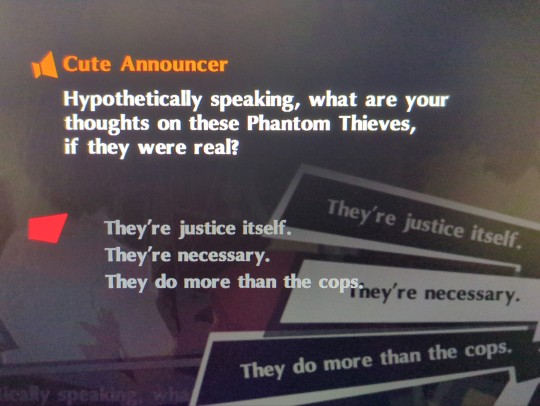
"They're justice itself" is just subjective and incorrect, because justice as a concept is individualized and given how each Phantom Thief has different reasons for being one it's ridiculous for even them to say. Their first target was before they even formed a group, and Ann was ready to kill Kamoshida. The others were not even going to step in, and they were going to respect her choice either way. All the members are so different, so this is an insane claim to make.
"They're necessary" is wrong because to say they are necessary is pretty disingenuous to all "justice" that has ever happened BEFORE they existed. I don't believe that the Thieves were a necessity per say, and personally I think their actions can only be judged on a case by case basis. Some Mementos targets for example have issues that stem beyond what they have done. Now they have their desires stolen but still have the issue that pushed them to immortality in the first place, plus a shitton of guilty baggage. The Thieves only help with the atonement, but not the push. How many of those people didn't just go right back to their past behaviors? How many of them got worse in other ways? Think about Futaba, she felt so guilty for something she thought she did, she formed a palace to condemn herself to die alone. To claim the Thieves are necessary to reform society implies that their method is the most effective, and I think that's a lot to claim for something they don't understand.
"They do more than the cops" I almost agree with. Legally the police in Japan in this game anyway (yes I'm aware it extends to reality in many ways, but I'm referring to just the game right now) are corrupt and flawed for the most part, but the thing I don't agree with is that this makes the Thieves a better alternative. They're not. For the same reason Yoshizawa says later, the Thieves can only do so much as vigilantes, and to imply that society should rely on these faceless nameless flawed people to fix society is not any better than what they have now. Especially with the method being unknown, potentially unsafe, and easily exploitable. I cannot be the only one who if the Phantom Thieves were real, would be extremely alarmed by the prospect of a group of vigilantes "changing hearts" right? It's so vague, and the pattern is dystopian. At least police methods are familiar
What I'm saying is that they're kids, and it's kind of insane that this game places Akechi as the narrative foil for the Thieves in their message and then makes it so easy to disregard because "he's an assassin so how could he know anything about justice". The Thieves don't either, and Ann was nearly a murderer. If the bar is "don't commit murder when you're infiltrating someone's mind" then it's far too low. I wouldn't trust a group of adults with this power to reform society, even less a group of teenage vigilantes. I'm 19, and I find this odd. And Strikers frames them as even more righteous, and it bugs me even more in that game. At least Royal has the third semester to give a bit more nuance to how big of a responsibility Ren was given, but that's also very frequently misinterpreted.
I love this game, and I love this fandom, and I have thoughts that get weird and ranty. I apologize, but I hope you all found this as interesting as I did.
#persona 5#p5#goro akechi#p5r#persona#persona 5 royal#p5 royal#ren amamiya#shuake#akeshu#p5 meta#analysis#philosophy#rants#this is longer than i was intending#please reblog and add to this#i love yapping about this game and i will respond to everyone
117 notes
·
View notes
Photo

Jezebel
Jezebel (d. c. 842 BCE) was the Phoenician Princess of Sidon who married Ahab, King of Israel (r. c. 871 - c. 852 BCE) according to the biblical books of I and II Kings, where she is portrayed unfavorably as a conniving harlot who corrupts Israel and flaunts the commandments of God.
Her story is only known through the Bible (though recent archaeological evidence has confirmed her historicity) where she is depicted as the evil antagonist of Elijah, the prophet of the god Yahweh. The contests between Jezebel and Elijah are related as a battle for the religious future of the people of Israel as Jezebel encourages the native Canaanite polytheism and Elijah fights for the monotheistic vision of a single, all-powerful male god.
In the end, Elijah wins this battle as Jezebel is assassinated by her own guards, thrown from a palace window to the street below where she is eaten by dogs. Her death, the biblical authors note, was prophesied earlier by Elijah and is shown to have come to pass precisely according to his words and, so, in accord with the will of Elijah's god.
Her name has become synonymous with the concept of the evil seductress owing to the interpretation of some of her actions (such as putting on make-up in order to, allegedly, seduce her adversary Jehu, who is anointed by Elijah's successor, Elisha, to destroy her) and calling a woman a “jezebel” is to label her as sexually promiscuous and lacking in morals.
Recent scholarship, however, has tried to reverse this association and Jezebel is increasingly recognized as a strong woman who refused to abide by what she saw as the oppressive nature of her husband's religious culture and tried to change it.
Jezebel's Changing Reputation
The story as given in I and II Kings presents Jezebel as an evil influence from the moment of her arrival in Israel who corrupts her husband, the court, and the people by trying to impose her “godless” beliefs on the Chosen People of the one true god. I Kings 16: 30-33 presents King Ahab as a wicked king seduced by the corrupting influence of his new wife and is an audience's introduction to the story:
Ahab, son of Omri, did more evil in the eyes of the Lord than any of those before him. He not only , but he also married Jezebel, daughter of Ethbaal, king of the Sidonians, and began to serve Baal and worship him. He set up an altar for Baal in the temple of Baal that he built in Samaria. Ahab also made an Asherah pole and did more to arouse the anger of the Lord, the God of Israel, than did all the kings of Israel before him.
Traditionally, the story of Jezebel is one of a corrupting influence on a king who had already shown himself a poor representative of his kingdom's religious culture. The biblical account assumes a reader's knowledge that Jezebel, coming from Sidon, would have worshipped the god Baal and his consort Astarte along with many other deities and also assumes one would know that the polytheism of the Sidonians was comparable to that of the Canaanites prior to the rise of Israel and monotheism in their land. Since monotheism and the kingdom of Israel are presented in a positive light, Jezebel, Sidon, and Ahab are cast negatively.
It could be that the biblical narrative depicts events, more or less, accurately but this view is challenged by modern-day scholarship which increasingly leans toward a new interpretation of the clash between Jezebel and Elijah as demonstrating the conflict between polytheism and monotheism in the region during the 9th century BCE. In this interpretation, Jezebel is understood as a princess, the daughter of a king and priest, trying to maintain her cultural heritage in a foreign land against a religion she could not accept. The historian and biblical scholar Janet Howe Gaines comments:
For more than two thousand years, Jezebel has been saddled with a reputation as the bad girl of the Bible, the wickedest of women. This ancient queen has been denounced as a murderer, prostitute and enemy of God, and her name has been adopted for lingerie lines and World War II missiles alike. But just how depraved was Jezebel? In recent years, scholars have tried to reclaim the shadowy female figures whose tales are often only partially told in the Bible. (1)
Although she has been associated with seduction, depravity, and harlotry for centuries, a more accurate understanding of Jezebel emerges as one considers the possibility she was simply a woman who refused to submit to the religious beliefs and practices of her husband and his culture. The recent scholarship, which has led to a better understanding of the civilization of Phoenicia, the role of women, and the struggle of the adherents of the Hebrew god Yahweh for dominance over the older faith of the Canaanites, suggests a different, and more favorable, picture of Jezebel than the traditional understanding of her. The scholarly trend now is to consider the likely possibility she was a woman ahead of her time married into a culture whose religious class saw her as a formidable threat.
Continue reading...
95 notes
·
View notes
Text

Hi. To be honest, the response to that Batter drawing was quite overwhelming. It was not made with erotica in mind, but it's a fair interpretation.
Now, my passion for OFF feels a tad wilted, and alike with a dead flower, I cannot seem to revive it. I'm happy so many people gathered a liking for the piece, but I don't think I can supply it further. Seems my own passions have escaped me without my knowledge and have seeped into the fabric of my work. Cool! Kinda nice how so many enjoy this little niche of gore, though.
To answer a few asks, I'm distantly excited for the steam release of the game, and I predict it will be a very good experience, new and changed as it is. Mortis Ghost's artistic vision has absolutely changed and grown with him, and I wish to see this new view applied onto the game. Will play, hopefully.
But I don't know how many OFF drawings I will be making, let alone posting. I feel spent, burnt, and a little bit soggy, haha. So, sorry! ❤️
#not art#beautiful space this tumblr ecosystem is#and im ever so grateful to play my little role in it#im so aaaaahhh so happy with the response! i never expected this...#sorry for the absence but i dont know when im going to post again#im making many drawings but none fit interests here#so! yea. i need a little break.
82 notes
·
View notes
Note
YO I KNOW HOW TO RUIN THE EVIL SCIENTIST!!!!!
So we do a little trolling-
Jk, darling wakes up with no problem, buuuuut she doesn't like that he's old now, doesn't like that he's got this weird aura going on (it's called being evil), nitpick everything she doesn't like and eventually, admits she doesn't like him anymore!
"I mean, thanks for reviving me, but I want a divorce."
So this ask plays really well into the "routes" you can take for Thomas if he ever becomes a yandere dating sim ML. The routes are as follows:
Reader remembers Thomas OR is good enough at trickery to make him believe they remember.
Reader doesn't remember Thomas BUT Reader is grateful towards Thomas and willing to learn how to live with him.
Reader is ungrateful towards Thomas/dismissive to him.
1 and 2 would be the "good routes" with 2 being better than 1. In 2, Reader isn't exactly like how Thomas remembers Reader to be, but Thomas loves Reader all the same because people can change and he accepts that. As long as Reader tries, he's satisfied and happy. This is more of a soft yandere route since Thomas would be possessive and stuff over Reader but Reader lives a normal life for the most part.
In 1, Thomas hyperfixates on past Reader, so while it's technically a good ending, Reader kind of has to live in their own shadow. This is also a route where Thomas is super yandere and locks Reader up, ensuring that Reader can't leave the mansion.
And for 3, Thomas has had many failed experimentations. A successful experiment would lead to Reader being cordial with him as a bare MINIMUM. If Reader dislikes Thomas, it means that his experimentation failed, so he'll dispose of the Reader and continue his experiment to revive his love.
Thomas is extremely devoted and delusional, but he's also calculative and pretty cold. If Reader was rude and dismissive to him, he wouldn't really be ruined -- just disappointed that his experiment failed again. He doesn't even need the Reader to be all over him, just being neutral is a success to him.
Once the Reader is rude to him, he doesn't view Reader as his love anymore. Instead, he views rude Reader as another failed experiment and is extremely detached. Though, he'd also feel massively guilty because he doesn't blame Reader for turning out rude -- he blames himself. It's all his fault he couldn't bring back Reader properly, it's his fault the experiment failed. So he'll do what he can to finally, finally succeed.

#yandere oc#male yandere#tsuuper ocs#yandere x reader#yandere x you#tw yandere#male yandere oc x reader#male yandere oc#Thomas Frankenstein Tsuu OC
71 notes
·
View notes
Text
devastated to have to do this but here's a list of why the end of arcane is actually hopeful in terms of the piltover and zaun conflict (and i admit i didn't get it originally either)
piltover and zaun fought a war for humanity itself together
we saw many piltovian families refused to help and ran away, and while originally sevika and scar also left jayce's meeting, both firelights and zaunites/jinxers showed up for piltover when it counted and that must've meant something when it comes to piltovians' views of the undercity and zaunites themselves, and vice verse too because zaunite leaders lead their people into that very battle too - jinx, ekko and sevika - and their people followed. they lost so much, won so much, celebrated and grieved together.
the entire council has been reestablished and sevika is on it
and yes, there's a lot to be said abt how different people doesn't necessarily mean change or improvement (esp if they're also elites who hold the same views, but again, context), but sevika's presence, despite being a minority vote, is definitely more than there ever was before, because it raises awareness and provides perspective - the undercity has been given a voice. there's a person up there now who knows what's it's like down there, what the people of the undercity need, and she's willing to stand up and speak out for it. and ofc, we can only guess what the general public knows abt the reasons ambessa and viktor were operating under, but i'd make the case that it matters that caitlyn gave the kiramman seat to sevika, bcuz the name bewitches people and she's somewhat of a war hero now.
caitlyn and vi are still there
with the kiramman fortune, the access to the kiramman archives through the kiramman key, and the fight caitlyn asks vi if she's still in (which she is, so add her to that list), i think it's very safe to assume that the two of them are going to dedicate their lives to rebuilding the two cities and the relationship between them, which neither of them can do without the other. we saw that even without a council seat, caitlyn remained incredibly influential in piltover so it matters that she's taking steps to atone for her mistakes and vi is there to guide her in the right direction.
#arcane#arcane season 2#arcane spoilers#arcane s2#arcane season two#caitlyn kiramman#arcane caitlyn#caitlyn arcane#arcane vi#vi arcane#vi#arcane sevika#sevika arcane#arcane meta#arcane discourse
37 notes
·
View notes
Text
okay so i saw some of the discourse ajout Emilia Perez and wantes to see it for myself.
TL;DR: dogshit movie. masterclass in transmisogyny.
the opening song tells us this is a story about violence and love, and it delivers on that promise: in this movie, masculinity is violence; a violence which Emilia (Karla Sofía Gascón) wishes to escape through transition. the film firmly states that Emilia's wish is a doomed one. she was born violent and violence will always be a part of her.
this is an idea inherent to transmisogyny: male bodies are violent, and therefore transfem bodies are violent. "abuser-bodied" is a term used to other us and justify our exclusion from queer and women's spaces. the film Emilia Perez sets out to repackage this idea in a veneer of shitty music, crime and family drama, and toothless takes on too many social issues to count.
the film is apparently interested in many topics; drug trafficking, kidnapping, murder, corruption, sexism, ineffective justice systems, etc. it takes time out of its two hour length to mention all of these, but not to say anything about them. midway through the film, lawyer Rita (Zoe Saldana) sings a #deep song about how all these corrupt politicians are "going to pay, to pay, to pay, to pay"—the implication being that they are going to pay for their crimes—but Rita has no intention of making then do so. the reason she's in this ballroom with them is to ask for their money for her and Emilia's charity—shes not making them pay, she's asking them to. the film wants to act as if it's commenting on social issues here, even though its completely uninterested in doing so. instead of highlighting social issues, it unintentionally paints Rita as a corrupt, hollow sellout. she knows these people, knows where their money comes from, but gets into bed with them anyway. her performative rage at the system is a hollow edifice that appeals to liberal Academy voters, and no one else.
considering what the film is interested in saying, i almost prefer that approach. in a widely (deservedly) memed-on song, Rita is introduced to the world of gender-confirming surgery in a spectacle meant to elicit the macabre, the exotic amd erotic. a doctor sings "man to woman, penis to vaginaaaaaa" while Rita excitedly dances and asks for more. The doctors voice is made robotic, calling to mind cyborgs and robotic women; robotic women like Emilia is soon to become.
Rita later attempts to convince a reluctant doctor to perform those surgeries on Emilia. in a tone of profundity, she claims, "if you could only see what he's shown me."
Note the masculine pronoun. Not only does Rita continually misgender Emilia during this conversation (for which Emilia is not present), but the two of them have only had one on-screen conversation: their first meeting, in which Emilia shows Rita her boobs and says in a raspy, hyper-masculine voice, "I wish to be a woman."
So what is Rita talking about here? The only possible answer is the range of strange, wondrous surgeries she has just been informed of, or the fact that trans people exist, both of which this doctor is well aware of. I suspect the film is gesturing at some nebulous idea of the unloveable other showing us true beauty through their resilience, but frankly that is a reach. The film chooses not to say what Rita is talking about here, likely because the film itself has no idea. What we are left with in that gesturing absence is that the surgeries, the act of changing your body in a way that others find both disturbing and fascinating, is not only the sum total of trans existence, but is itself somehow meaningful; aren't the trannies brave for mutilating their bodies this way? For choosing to make themselves an artificial mockery of womanhood in order to be true to themselves? Isn't there beauty in their struggle to be recognized as something they clearly are not? It's a dismal, patronizing view of transfemininity. But before the conversation ends, a song breaks out in which Zoe Saldana, not Rita, turns to the camera and proclaims to the audience that she will always have our backs. Forgive me if I don't fall at her feet in gratitude.
the specter of Emilia's past, as a cartel boss and as a man, hangs over her constantly in a way the movie does not seek to challenge. she tries to change her ways: fake her death, become a woman through extensive surgeries, and use her money to help those affected by cartel violence. but of course, when her formee wife, Jessi, tries to move on from the husband she believes is dead, Emilia immediately sinks into her "male" voice and physically assaults her, then sends goons to beat and threaten the boyfriend's life. this results in Jessi and her boyfriend kidnapping Emilia during the climax of the film. As Jessi begins to suspect who Emilia really is, she asks "who are you?"
her reply of "Emilia," is drowned out by Jessi singing her deadname. immediately after this, we see Emilia for the last time as she is thrown in the trunk of a car, and all three of them perish in a burning wreck. Emilia cannot escape her manhood, the violence inherent in her body. everyone weep for her; what a tragic figure, the tranny.
48 notes
·
View notes
Text
Spark notes on "Callum lost his true heart" in S2. Excellent true heart meta here by @kradogsrats on how the concept works more generally that I would 100% recommend reading before coming back here
The true heart is a gift of childhood. For a few wonder-filled years, we each have innocent eyes to experience the world’s beauty in a simple way.
We see Callum on the cusp of being 15 undeniably believing that the resolution to the war can be that simple (even if we know well before S7, wherein Aaravos directly says they have similar views of how the world works, that Callum does not hold onto this simplicity for long). This is demonstrated, as Krads points out, in Callum's conversation in 1x02:
CALLUM: Can't you just make peace with them? HARROW: It's not that simple. CALLUM: It seems pretty simple to me. You don't want to die, I'm sure the elves and dragons don't want to die, so everyone agrees.
This emphasis on what people want over what they're devoted/committed to ("I'm sure they don't want to die" -> "I am already dead") is similar to Ezran's in arc 2 ("We all want peace and we all want love [...] you want to hurt someone else") that is both dismantled and upheld ("You want Janai to attack!" / "I want them to hurt"). To hammer it in further, Harrow even denotes that Callum is operating under the illusion of childhood, where adults have all the power/freedom.
What happens, I think, over the course of season one and season two is a bit of a domino effect, with Callum making choices in season one that season two continually 'knocks' down so to speak. The first and easiest example, perhaps, is Callum's choice in 1x03 between staying and trying to save Harrow... or choosing his little brother, who will remain in danger the longer they stay at the castle (Runaan and Viren both presenting strong antagonistic forces) and even worse danger the longer the egg remains.
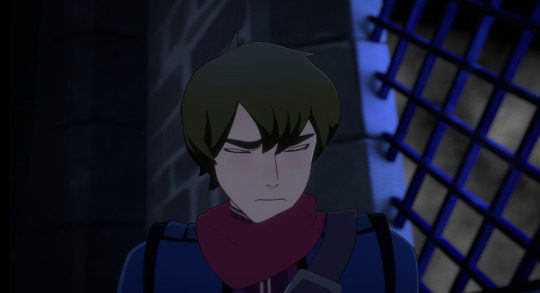
Callum glanced out a tower window and saw Ezran in the courtyard searching for him. But how could he leave the tower when the king was in so much danger? Callum tried to think of what the king would want him to do. “I’m coming, Ez,” he called out the window. He gave one final look back at the door to King Harrow’s chamber, then bolted to the spiral staircase. He took the stairs two at a time, trying not to look at the dead bodies strewn on the way to his little brother.
—Book One: Moon novelization
Now, this choice makes sense. It is in many ways just another version of the same one (choosing Ezran and his safety) that Callum had made earlier this same episode. Both are more complicated choices ("the right thing, I hope" does not beget certainty, and therefore does not beget simplicity) but we'll get to that in a moment.
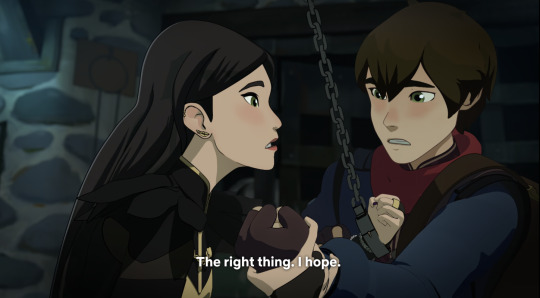
The final domino set up in season one for Callum's true heart is, I think, choosing to destroy the primal stone. The reason I say these are the dominoes, so to speak, is because each of these choices are made in a very distinctly Callum-y way, by which I mean: he thinks to a certain degree he can skirt the consequences.
This is not to take away from the weight of the choices Callum is making — they're still sacrifices, they're still honourable, he's still aware that he's risking Something — but there's still clearly a 'block' of some kind between "this is what I'm choosing to sacrifice" and "this is the full consequential weight of my sacrifices".
For example, the primal stone means a great deal to Callum. He states that "without this, I'm nothing" and it's a great powerful tool of magic. However, when Callum destroys it, it is currently unknown to him that this means no more magic, point blank. The consequence for his choice is steeper than he'd imagined, and now he has to live with the reality of it (for a time, anyway, but it's not like the journey to primal magic isn't gruelling, anyway).
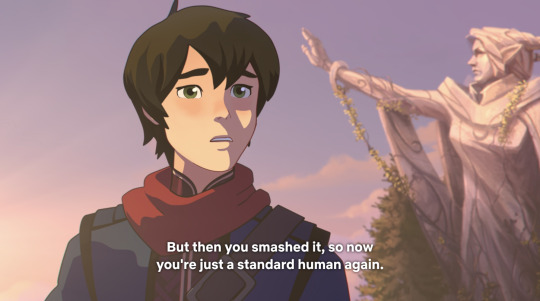
But as we grow up, we are forced to make choices, sacrifices, compromises. And they change us forever.
The same happens when it comes to learning about Harrow's death. Callum was happily writing him a letter two episodes ago, reassuring Ezran in 1x03, etc etc. And yet:
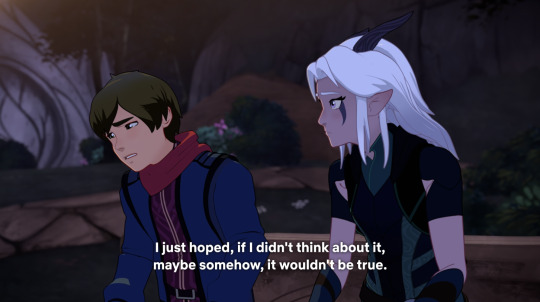
Callum made a sacrifice, then convinced himself that maybe he hadn't, and had to face the devastating reality of what he knew was most likely, on top of why Rayla wasn't able to tell him for the same reason(s) he couldn't tell Ezran.
I also want to highlight Claudia (and Soren)'s betrayal of Callum as well for two reasons. The first, and less interesting/important one in some ways (to me, anyway) is that if Callum's betrayal of 7x02 contributes to the last vestiges of Ezran's true heart being snapped to pieces, it would make sense that Claudia's betrayal would likewise contribute to Callum's.
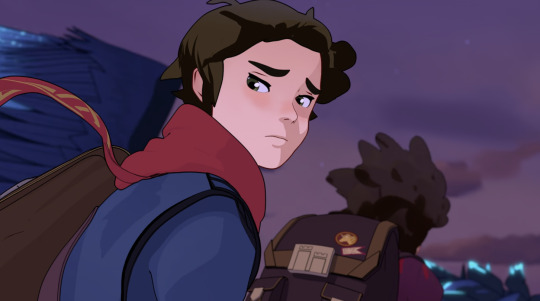
The more interesting/important facet of the Callum/Claudia breakdown is, to me, what happens before Claudia shows her true colours, and whereupon she hasn't done anything (knowingly) wrong to Callum yet, and still:
RAYLA: Callum, I know you trust them, but if we let them come with us, by the time we know the truth, it'll be too late. Do you understand? We'll lose everything. CALLUM: So what do we do? How can we figure out if it's help, or a trap?
Callum has already made a Compromise. He trusts Claudia, but Rayla doesn't, and he ultimately trusts Rayla more than Claudia, even this early on, the same way he trusted Ezran more than Claudia (and didn't trust Claudia with Ezran, then) in 1x03. So he goes along with the illusion plan, which would've been pretty crappy to do to an old friend if Claudia (and Soren) had been genuine in their offer to help.
So I think in quick succession over a few days, most if not all of Callum's true heart gets shredded to pieces within the first few episodes of season two. Barring that, I think 2x07, specifically the choice to do dark magic, takes whatever remains.
AARAVOS: You call it corruption. I call it compromise.
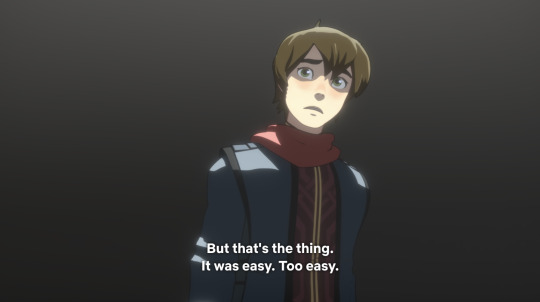
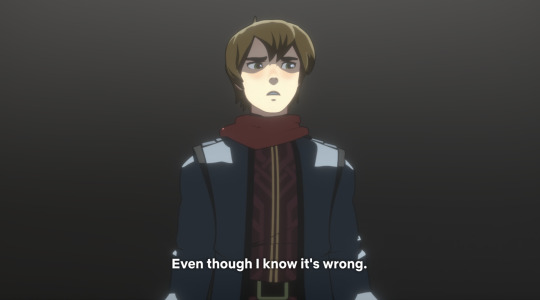
'Could he really bring himself to go through with his plan? What if he didn’t succeed? What if he compromised his beliefs and it was all for nothing? […] But Rayla was in trouble.' —book two: sky novelization
While Aaravos lists off choices, sacrifices, and compromises as though they are separate things, and occasionally they can be, I think more often than not in life and within TDP that they are all the same thing.
Do you choose (sacrifice) your father or your baby brother? Do you sacrifice your oldest friendship (compromise) to ensure your travelling party can be safe? Do you use dark magic (a compromise, a sacrifice of yourself) to save someone you love?
And Callum's dark magic use falls into his previous pattern of you made a choice, and you knew there would be consequences, but you never dreamed it'd be This. And finally — finally — in 5x08, Callum makes a choice with the full knowledge of the consequences, of exactly what he's risking — and what he refuses to sacrifice.
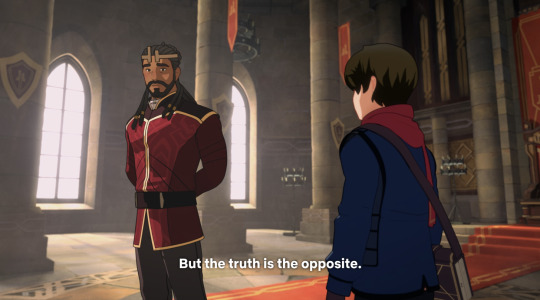
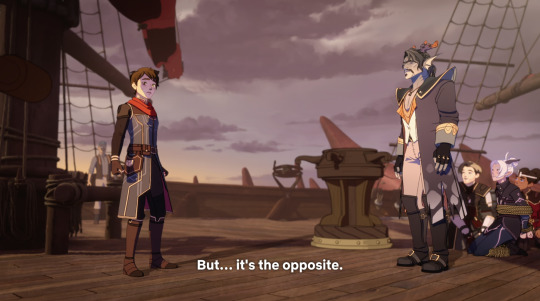
His true heart has been gone for a while by this point, I think — but within the narrative, Callum is an adult from 5x08 onwards. He knows undeniably what he'll sacrifice and why, and what he won't.
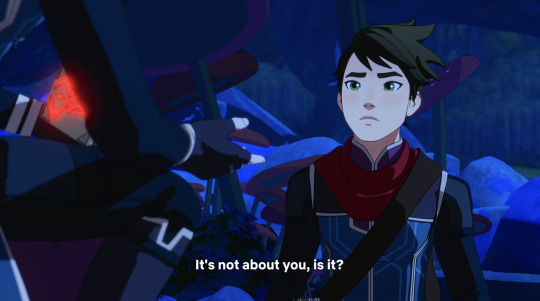
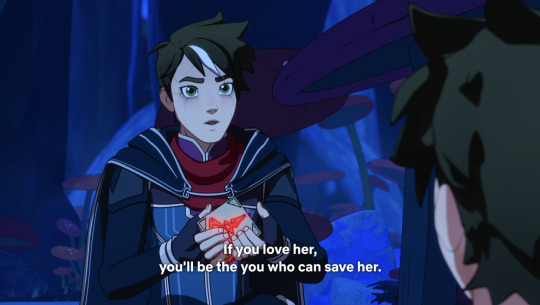
(Something something sacrificing your true heart to protect the person who is your heart and your truth.)
#tdp#the dragon prince#callum#tdp callum#tdp meta#s2#arc 1#analysis series#mini meta#analysis#i also don't know (tbh) if rayla as we see her in show canon. ever has her true heart but#hmm
34 notes
·
View notes
Note
hello! question, how are you transfem and transmasc at the same time? /genq im kinda confused on how that works. no hate! ^^ coming from a cis ally btw!
hello, glad you stopped by! thanks for letting me know! i'm always happy to talk to cis allies!
there's a lot of ways someone can be transmasc & transfem at the same time- everyone has a unique childhood, upbringing, and are approached and addressed completely uniquely by strangers. everyone has a unique body, and puberty, so the way the world affects a person will vary drastically from person to person within a given group. someone could be assigned male at birth and have a penis but be treated like a girl for their entire childhood if not life, depending on if they identify as one or not. this may be gender affirming, or it may cause dysphoria. someone can easily get misgendered in these situations and feel like it's impossible to be seen as a cis man and it's important to accept that as a real transmasculine experience!
people assigned male at birth, people with penises and people with high testosterone bodies face a lot of scrutiny when it comes to their genders and bodies. you have to run through a gauntlet of manhood otherwise you're a fag or a girl. so many people assigned male at birth, or those who have high testosterone bodies or penises are completely robbed of boyhood and manhood because people around them just refuse to see them as one because of how they look, sound, and act. its honestly very hard to be a masc and a man, too, people force you to do so much and change so much about yourself, there's no wonder a lot of amab people identify as transmasculine. they are
same happens for a lot of transfeminine people, no matter what you're assigned at birth, you can be transfeminine, due to how restrictive we are with femininity and womanhood on a whole in society. the way white colonist cisheteronormative patriarchy views femininity, womanhood, bodies with vaginas, and bodies with high estrogen levels is so restrictive and controlling that many people get left out, even if they were assigned female at birth.
people assigned female at birth, people with vaginas and people with high estrogen levels face a lot of scrutiny when it comes to their appearance, gender, biological sex and so on. sometimes womanhood is robbed from people who were assigned female at birth, because of how they look due to other factors like muscle density or volume, body/facial hair not from intersex conditions, height, weight, racial features, gender presentation, and other factors.
for me, i'm intersex, so i wasn't allowed to have any gender at all. too masc to be a girl, too femme to be a boy. i was always called a dyke or fag. there was really no way for me to fit into cis girlhood, womanhood, boyhood or manhood. ive had to transition into gender itself because it's just been robbed from me. some of my facial features have been weaponized against me, like deep eye orbits, strong brow ridge, strong jaw and cheek bones. people thought my pre testosterone face was "too masculine to be a woman's."
we all have to jump through hoops when it comes to gender! and it's not okay. we shouldn't have to do this, but it's where we're at, and it's okay. transfemasc/transmascfem people all have unique experiences and they're worth hearing out! mine is realizing that my womanhood cannot be cis because i've had to chase it. my manhood cannot be cis because i've had to make it happen. and i'm okay with that. i like being a man and a woman my own way. it's who i am. it was not handed to me, though. i hope that makes sense!
take care, thanks for stopping by! we love our cis allies <3
32 notes
·
View notes
Text
The ending of Danganronpa V3: Not the cliché twist people think it is.
Probably the most controversial part about V3 is the ending. I love it. I love it so much I have a shirt of it. I can see why others don’t somewhat but at the same time I’m like why?
Many people say the fact the game is fiction makes it meaningless, but I strongly disagree. I understand that an 'it was all fake' or 'and then they woke up' ending is annoying and overused and, depending on what happens in the piece of media, just bad writing, but DRV3 isn't one of those endings.
And if you do believe the game was meaningless, then congrats you fell for Tsumugi's lies, hook line and sinker.
In the sixth trial, Shuichi talks about how even though the game was fiction, it still hurt him to see the people he cared about die.
Even though they are being told that everything they went through is meaningless, it is real to them; if they feel sadness and anger and love, it’s just as real; it’s just as meaningful as in the real world.
Another thing is the theme of the whole game is truth vs. lies, so wouldn’t it make sense for the final twist to be that what they thought was the truth is a lie?
In the first two games, the final trial ends with a battle of hope vs despair where hope always triumphs and despair is crushed, but in V3 it’s different.
Tsumugi wants them to continue the game. The fans want them to continue the game.
Choosing hope—sacrificing someone to go on to the next killing game—will just cause the cycle to repeat, but choosing despair is also bad; it causes people to give up and lose everything.
Shuichi doesn’t want Maki (and Kiibo) to have to go into another killing game, but they also don’t want to fall into despair. So he refuses to vote, and as much as Tsumugi begs and pleads, he stands his ground.
The viewers also refuse to vote, proving that fiction does have the power to change reality, a powerful message that is one of the main reasons this ending is so great.
Even though Shuichi Maki, and Himiko were fictional characters, they changed the outside world and stopped a whole franchise, a whole movement, and in real life, fiction can spread ideologies, beliefs, and concepts, and these things can spread to people like wildfire and bring people together in ways that normal methods, (like by mouth,) cannot.
That's why artists try to put messages in their art, musicians in their music, and directors in their movies and TV shows. They know that's the type of media that will have the most reach and spread the fastest.
Or even social media spreading information; it might not be the best source, but it still spreads rapidly.
Media has influenced our way of life for years, influencing our speech, thoughts, and cultures because of what it says; this is what V3 is trying to show.
Shuichi also talks about using his friends deaths and the lie of the killing game to change the world.
This is why it matters; this is the power of fiction.
Shuichi using his friends' deaths, which may have been seemingly useless anyway, to take down the show that has trapped them in a cycle of deceit and forced them to play their game.
It’s also great when you remember that Shuichi was afraid of finding the truth, and Kaede and Kaito helped him gain more confidence.
He vowed to Kaede he would end the killing game, and this man not only found the biggest truth ever, he not only ended the game, but ended the whole franchise.
If that's not character development, I don’t know what it is.
Another reason people hate the ending is the portrayal of the fans, the fans are portrayed as Danganronpa obsessed, and they are shunned by watching the senseless killing of people for entertainment.
It’s a world where everyone has become so desensitized to kids getting killed on TV that they gather around screens all over the world eager to watch the next installment; that’s why there are 53 seasons.
The fans in the ending are an exaggerated view of what Kodaka feared would happen.
It's not trying to bash the fans of today but the fans of the future if this continues and we don’t care about the deaths anymore, and we just want more because you can have too much of a good thing.
It also has good messaging about fans (and corporations) tearing a TV show or game series apart in compensation for more, deriving it from the original message.
For example, Squid Game a show about the flaws of capitalism and exploitation for entertainment, was remade into a reality show by Netflix, Mr. Beast, and Amazon Prime to capitalize on the success of Squid Game when it first came out, actively hurting real people in the process, just for the sake of making money.
The ending of V3 reminds us that the connections we make and the experiences we have give our lives meaning. And even if we only affect one person with our actions, it will be all worth it, and that's the greatest truth of them all.
It’s about freedom, the problems of beating a piece of media to death just to have more, using deceased loved ones' wishes to help move forward, and finding meaning in the things that seem meaningless.
The V3 ending is a roller coaster of emotions and a masterful experience. It serves as a great ending to a great series that keeps you on the edge of your seat, makes you feel sympathy for some fictional characters, and still holds up even eight years later.
I don't think this rant/analysis will fix the wedge in the fandom this ending has caused (we've argued about much more ignorant things in the past.) But I hope it at least resonated with you and re-kindled elements you remember loving about the ending for people who did enjoy it; and for those who didn't I hope this gives you some insight into why I and many others appreciate the ending.
So before your start to conclude that V3's ending was meaningless think to yourself-is that the truth or just the lie you were meant to believe.
#drv3 spoilers#danganronpa v3#danganronpa#drv3#The ending of v3 is peak#Idk how people still don't like it eight years later#Maybe the true v3 ending was the friends we made along the way#Sorry if it sounds scatter brained that's how my thought process works
21 notes
·
View notes
Note
OMGGG UR RECENT POST WAS WRITTEN PERFECTLY. I am an asexual lesbian and I love byler for many reasons. 1. Because I think WIll is one of the most accurate representations of what it is like to be gay EVER written. Will is so relatable. As a lesbian I have unfortunately fallen for MANY of my friends. There was one notable time where a girl I was really close with accused me of liking her (i did oops) and it became a huge thing. She was disgusted and told anyone she could and it was the worst feeling. So when I see a character in the same situation I am obv gonna want them to have what I didnt. 2. Because Will’s character alone is so tragic and I want him to have a happy ending. I also really like angst and watching sad things. I love crying and movie and tv shows. Every single one of Will’s scenes have gotten me. 3. Because SO many people are SOOOO hateful online. The straight up homophobia over a queer ship is UNBELIEVABLE. I need this people to be wrong SO bad. I want to see them mad I want to see them metaphorically slapped in the face that times ARE changing and that they are the problem. I also think it is the suspense that has been built. I def would love it still and ship it, but if there wasnt so much suspense built I dont think it would be as big. I hate how people always try to claim its sexualizing because not a single thing on here its sexualizing them. Literally everyone just wants a kiss and the rest is all wholesome so I dont see how it is sexualizing in any way. LGBTQ representation is for everyone in the community. I do not really get why people try to claim it is not. I will never understand why people within the community try to pick fights with each other instead of attacking the actual issue (homophobia) it is not productive in any way and we should all be standing with each other in growing representation for the community as a whole. Sorry this is so long I just thought u might appreciate someone agreeing with you because u are totally right.
EXACTLYYYY!
I’m just so over seeing this “tragic homosexual” pattern in every single piece of lgbtq media (reddie, cmbyn you get what i mean) because as much as it is realistic it’s just so depressing to see it over and over again when it’s already terrible enough to deal with in real life. And as you said, Will has already been through so much, adding unreciprocated love for his best friend on top of everything would be the final nail in the coffin and only prove that he in fact was right about never finding love. That would be so cruel!!!
It’s also so obvious that if Will was a girl nobody would call bylers delusional and just straight up throw hate and shade at them. It’s clear it all stems from homophobia and the GA’s heteronormative point of view, which is really sad but that’s unfortunately the society we live in
25 notes
·
View notes
Text
liberals will happily support liberation on tv or in a book. but they'll never support it when it's knocking on their doors.
how many more tens of thousands of palestinians have to be murdered before you care more about them their idk a fucking tv show. or a burger. or a politician.
like meanwhile the world is never going to be the same. how can it just go on for you like nothing's happening?????????
#this has changed how i view so many people#and then you go and apologize for GENOCIDE#for instance the rogue one fandom has driven me up a wall for years with its racism and xenophobia but this has been wild#and in my personal life... forget about it lol#btw basically every white democrat is dead to me even the progressive ones cough katie porter i never liked her tho lol#and ritchie torres but he's been crazy#progressive churches near me are showing their asses and i am EMBARRASSED#okay except i think the unitarian universalists as always#christian zionists die challenge#free palestine
16 notes
·
View notes
Text
Hey, so I don't want to be that guy, but when are we going to acknowledge that Akechi was right?
No, I obviously don't mean about the things he was very clearly wrong about. I'm referring to the things he says in interviews about the Phantom Thieves. I hate how many people switch up after playing through his betrayal who previously agreed with his views, because nothing he said is wrong and nothing he did changes that fact. He speaks in the TV Station on the objective facts that he should know about, and with or without the context of his form of justice those facts stay true. It's a fallacy to claim that his form of justice being universally less approved of makes the Phantom Thieves better by comparison, or discredits anything he said. I don't think the Phantom Thieves are evil, or that they should necessarily be imprisoned, but I do think that they are not morally sound. They're kids. Prior to his betrayal I think he served his purpose well, but it's easy to disregard the validity of his words when you find out that he's a murderer. With the knowledge he SHOULD have had (and that many DID have), everything he says is true. And honestly? It still can be true for basically the entire plot of the game. Mishima's confidant tests the thieves in that way. They could have changed the hearts of anyone who's not a persona user, for any personal reason. It's a slippery slope.
I'll use these three options as an example for why he's right:
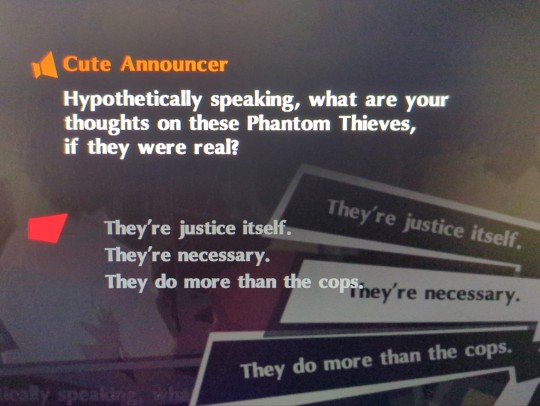
"They're justice itself" is just subjective and incorrect, because justice as a concept is individualized and given how each Phantom Thief has different reasons for being one it's ridiculous for even them to say. Their first target was before they even formed a group, and Ann was ready to kill Kamoshida. The others were not even going to step in, and they were going to respect her choice either way. All the members are so different, so this is an insane claim to make.
"They're necessary" is wrong because to say they are necessary is pretty disingenuous to all "justice" that has ever happened BEFORE they existed. I don't believe that the Thieves were a necessity per say, and personally I think their actions can only be judged on a case by case basis. Some Mementos targets for example have issues that stem beyond what they have done. Now they have their desires stolen but still have the issue that pushed them to immortality in the first place, plus a shitton of guilty baggage. The Thieves only help with the atonement, but not the push. How many of those people didn't just go right back to their past behaviors? How many of them got worse in other ways? Think about Futaba, she felt so guilty for something she thought she did, she formed a palace to condemn herself to die alone. To claim the Thieves are necessary to reform society implies that their method is the most effective, and I think that's a lot to claim for something they don't understand.
"They do more than the cops" I almost agree with. Legally the police in Japan in this game anyway (yes I'm aware it extends to reality in many ways, but I'm referring to just the game right now) are corrupt and flawed for the most part, but the thing I don't agree with is that this makes the Thieves a better alternative. They're not. For the same reason Yoshizawa says later, the Thieves can only do so much as vigilantes, and to imply that society should rely on these faceless nameless flawed people to fix society is not any better than what they have now. Especially with the method being unknown, potentially unsafe, and easily exploitable. I cannot be the only one who if the Phantom Thieves were real, would be extremely alarmed by the prospect of a group of vigilantes "changing hearts" right? It's so vague, and the pattern is dystopian. At least police methods are familiar
What I'm saying is that they're kids, and it's kind of insane that this game places Akechi as the narrative foil for the Thieves in their message and then makes it so easy to disregard because "he's an assassin so how could he know anything about justice". The Thieves don't either, and Ann was nearly a murderer. If the bar is "don't commit murder when you're infiltrating someone's mind" then it's far too low. I wouldn't trust a group of adults with this power to reform society, even less a group of teenage vigilantes. I'm 19, and I find this odd. And Strikers frames them as even more righteous, and it bugs me even more in that game. At least Royal has the third semester to give a bit more nuance to how big of a responsibility Ren was given, but that's also very frequently misinterpreted.
I love this game, and I love this fandom, and I have thoughts that get weird and ranty. I apologize, but I hope you all found this as interesting as I did.
#persona 5#p5#goro akechi#p5r#persona#persona 5 royal#p5 royal#ren amamiya#shuake#akeshu#p5 meta#analysis#philosophy#rants#this is longer than i was intending#please reblog and add to this#i love yapping about this game and i will respond to everyone
47 notes
·
View notes
Text
”Skybound ruined Jaya for me” Skill issue.
#ninjago#Jay Walker#Jay ninjago#nya smith#nya jiang#nya ninjago#jaya#I have many thoughts about this line of thinking but I will try to keep it brief#1. Skybound came out almost nine real life years ago#the writing and characters have changed a lot since then so obviously so has their relationship#2. Skybound has literally some of the worst character writing in the entire show#it includes characterization that was not seen before that point and has never been seen again#And was just a bad outing for literally everyone in involved#3. It didn’t happen#I know that Jay and Nya remember it#but canonically it literally didn’t happen and effects nothing going forward except for that one nod in the WildBrain era#TLDR; basing your entire view on the ship on one incredibly bad season that doesn’t effect anything in the rest of the show#is kinda dumb#(I know I said I was keeping it brief but!) ALSO there were other much worse pairings with the same issues in television at this time#I don’t want to heart shit about how Jay is an obsessive creep unless y’all have seen the shitshow that was tmnt 2012 apriltello#because that was a nightmare that made every character involved infinitely worse#Like Donnie in the first few seasons is literally what people say Jay is like in Skybound#which sucks cause he’s my favorite character and when April is not in the room he’s fantastic#anyway#captains log
40 notes
·
View notes
Text
there's an essay jumbled up in my brain about dunmeshi's beginning and how clever and deceptive it is as a sleight-of-hand trick that distracts the audience from the depth and scope of the worldbuilding and foreshadowing that's being set up the entire time by dangling zany characters and wacky dishes and biology fun facts in front of us, and how that serves to catch invested viewers off guard when those elements come to the forefront, but also how it works against it with other viewers wanting "more" and not seeing it because the plot bait isn't laid out up front
how people getting frustrated with the characters "not taking things seriously" is mirrored and refuted in the confrontation between Laios and Shuro. how the characters' attitudes aren't just a result of shallow low-stakes "comedy rules" where nothing matters, but are an extension of their personalities (Laios's nonstandard expression of emotions being offputting even to people he knows) and the world and social environment (adventurers being desensitized to death and injury because resurrection magic is commonplace). the way the party refers to "saving Falin" instead of "retrieving Falin's corpse," indicating that they still see her with full personhood, and how that phrasing leads to some readers/viewers believing that Falin is alive in the dragon's stomach, conscious of being slowly digested while the party carelessly fucks around "wasting time." how the weird tonal dissonance makes sense in-universe and yet is deliberately challenged more and more the deeper the party goes
all the character building and pieces of lore slowly weaving together the shape of the larger world, laying the groundwork for the major themes that will surface later. so much is right there in the "low-stakes" early episodes if you know what you're looking for (or pass the perception checks).
it can be so satisfying to see new viewers/readers pick up on the clues even in the earliest "simple" episodes, or notice new things and make connections yourself....and it can also be frustrating to see people dismiss oddities and dissonance as shallow or bad writing because they don't expect a "cooking anime" to have depth like that. why try to question and understand and peel back the layers when you don't expect there to be any layers?
why can't laios take things seriously for once?
#mypost#i'm majorly out of practice for doing any real critical cohesive writing lol#trying to put this into coherent words has been such a mess so here's a vague gesture at my thought process about it#it's both my favorite and the most frustrating thing to see#because i've seen SO MANY people say they dropped the show after a couple eps thinking they know what it's about and where it's going#a cute but ultimately unsustainable gimmick#people for whom the characters and the food/biology infodumping weren't enough of a hook#but i wouldn't change anything about the structure to put a more obvious plot hook in the beginning#because it would give the game away TOO much#i LOVE how the audience has to acclimate to the characters' attitudes about death#only for our assumption that it's all normal and fine in this world to be thrown back in our faces#how we're left to notice the winged lion appearing in statues and carvings and coins and armor in the background#long long before it's ever brought up as a real entity by the plot#the history of the kingdom laid out in plain view but nevermind that. magic painting food!#i've seen the language around falin and her resurrection cause so much confusion#but of COURSE the characters involved wouldn't directly say 'we need to get her corpse to revive it'#bc pragmatically they already understand that as their goal. it doesn't need to be stated out loud; it's just how this process works.#but also they don't SEE her as an object. a dead body.#they need to 'save her before she's digested.' 'the spell couldn't reach her in the dragon's stomach.' 'hang in there falin'#death isn't real to them. not really. and so it doesn't quite feel real to the audience either#not until they find her skull and that realization slams home#like......i keep comparing it to gravity falls#which is episodic and goofy in the beginning but also has a much more obvious plot hook to keep people interested#(a main character entering a secret bunker indicating that he's lying about his ignorance of the town's mysteries)#the main characters in gravity falls are AWARE that there is a mystery to be solved and are trying to find more information#but i don't think that approach would work as well for dm!#laios's goals were never that lofty. not until they HAD to be because the situation demanded it of him#it's the characters trying to solve one personal problem and finding themselves entrenched in something vast and dramatic#that they weren't even fully AWARE of when they set out. and we the audience are on that journey with them!#it's SUCH a good structure i wouldn't trade it for anything. but also. tragic to see people give up and dismiss it so fast.
18 notes
·
View notes
Text
I really wish people would stop being obtuse with their readings about things. Is it really demonizing The Thing or is it deliberately using a social perception and common tropes to frame the character in a certain light so it can deliberately subvert those things at the precise moment when it is necessary to prove that point that people are Not Like That?
#obviously not a catch all because there are definitely pieces of media that are guilty of demonizing things#but sometimes the crit I see on here and even out in the real world is just extremely shallow and it baffles me#like for example back in my drugs and addiction in film and lit class one of the guest speakers we had was like ‘I’ve never seen a good#addict in a heroic role in media and we will never see that’ and… I was sitting there like… midnight mass was only a year old#to this day I will assert that riley flynn is one of the best heroic depictions of addict ever and I will not change my mind on that#many such cases in the mike flannagan universe including danny torrance in doctor sleep as well (which mike has said was part of his own#recovery process). not to mention I would also posit crozier as the same to an extent just by the symbolism of his alcoholism as a mechanism#of empire used to supress and opress him. and I think about those and then I see so many characters everywhere that fall into the same#category. and it really baffles me how people can just. fucking miss all of that#anyways yes this is also about the previous post like girl what the fuck#I need people to learn what actual media literacy is and then also. read more media. read different media. become well-read and well-viewed#or perish by my hand
9 notes
·
View notes